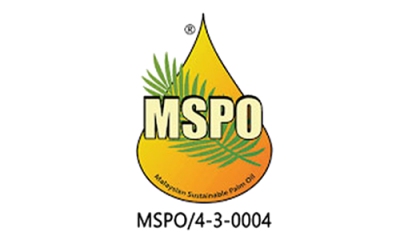SOPB aims to source and produce high quality and sustainable palm products throughout our supply chain. In February 2019, SOPB Sustainability Oil Palm Policy was launched as a testament of our commitment towards No Deforestation, No Peat and No Exploitation (NDPE).
Planted Area84,487 |
7 |
|||
Group FFB Production1,193,846 |
Group CPO Production373,998 |
Group Palm Kernel Production 83,007 |
7 |
|
| (a) SOPB Group -
100 |
||||
| (b) 3rd Party Suppliers - CPO :
100- PK :
100- FFB :
100 |
||||
Planted Area84,487 | ||||
7 | ||||
Group CPO Production373,998 | ||||
Group Palm Kernel Production 83,007 | ||||
Group FFB Production1,246,249 | ||||
7 | ||||
| (a) SOPB Group -
100 | ||||
| (b) 3rd Party Suppliers -CPO:
100-PK:
100-FFB:
100 |
||||
Certification
Sustainability Milestones
-
1968

SOPB practices responsible and good agricultural practices.
-
1997

Reviewed and updated the standard operating procedures incorporating sustainability aspects including Practice NO Burning for new development and replanting activities.
-
1999

Launched the first Occupational Safety and Health (OSH) Policy.
-
2013

Formally established a Sustainability Unit within the SOPB Group operational premises.
-
2014

Launched Environmental Sustainability Policy and Social and Community Policy.
First ISCC certification.
Participated in MPOB MSPO certification standard Pilot Audit for 1 Palm Oil Mill and 1 Estate (Galasah POM and Sg. Balim Estate).
100 % Traceable to SOPB Group Plantations. -
2015

First MSPO Certification.
Published first SOPB Sustainability Report.
Established the Tinbarap Conservation Area earmarked for conservation project where several research studies are on-going.
Collaboration project between MPOB and SOPB on "The Development of Infrastructure and the Research Programme on Ecosystem Carbon and Nitrogen Dynamics of Tropical Peatland in Sebungan / Sabaju Estate, Sebauh Bintulu". -
2016

Participated in MPOB MSPO General Principle for Refinery Pilot Audit (SOPEO).
Formally reviewed and established Group guideline on the "Protection of Riparian Buffer Zone & Slope Policy and Guidelines on Establishment of Riparian Buffer Zone".
Undergone MSPO Accreditation Audit witnessed by DSM & MPOCC for Sepakau POM & its supplying estates.
Engaged with RSPO approved Consultant to conduct High Conservation (HCV) and Land Use Change Assessment (LUCA) for the Group planting post December 2005.
Collaboration project between MPOB, SOPB and Universiti Malaysia Sarawak (UNIMAS) aims to assess and quantify carbon stock, floristic composition, and biodiversity of tropical peat swamp forest designated as HCV Area in Tinbarap Estate Miri.
Collaboration project between MPOB, SOPB and Nagoya University on "Balancing Development of Oil Palm Plantations with Conservation of Tropical Forest Ecosystem". -
2017

100% ISCC certification for all eligible operation units.
Published first Group Sustainability Report in line with the newly published Global Reporting Initiative (GRI) Standards issused by Global Sustainability Standards Board.
3rd review of Occupational Safety and Health (OSH) Policy in May 2017. -
2018

Participated in MPOCC programme on the MSPO Supply Chain Certification Standard (SCCS) Pilot Audit for Refinery (SOPEO), Biodesel Plant (SOPGE) and Sabaju Palm Oil Mill (SaPOM).
-
2019

Launched the Oil Palms Sustainability Policy.
Launched the Sustainability Dashboard on SOPB website to report on Sustainability Progress.
Revision of "Whistle-Blowing Policy & Procedure" to assist employees and stakeholders to raise concerns in a safe manner on all improper conduct observed within SOPB without fear of retaliations.
Launched the Free, Prior and Informed Consent (FPIC) Procedure.Launched the SOPB Grievance List to improve on transparency of supply chain verification and reporting.
Published a paper on "A Case Study Into The Sustainability Journey and Biodiveristy Conservation Projects in Sarawak By Sarawak Oil Palms Berhad".
CORRECT AS OF 05 JULY 2022

